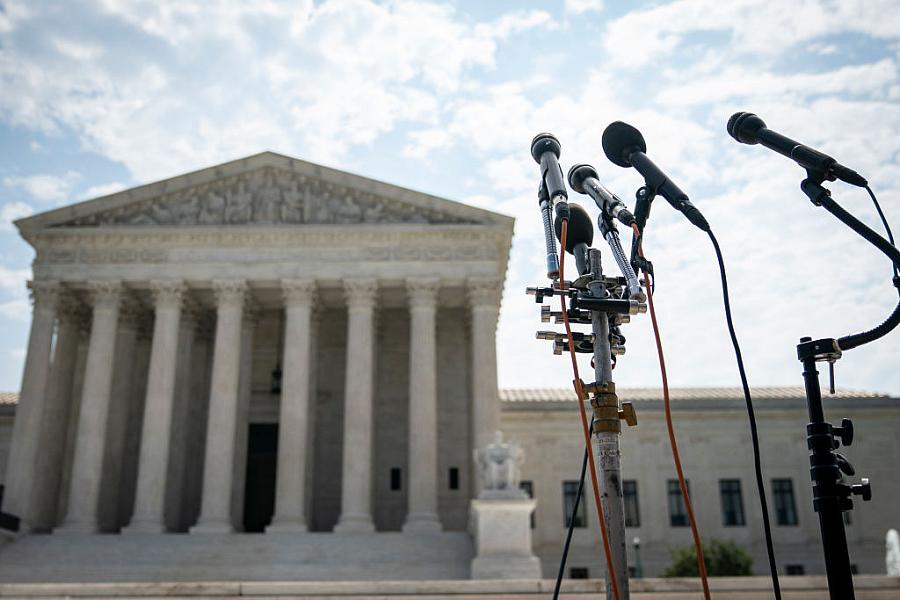Health Care on the Line: The ACA is my lifeline

The Supreme Court is hearing the latest legal challenge to the Affordable Care Act today.
(Photo by Drew Angerer/Getty Images)
Editors’ Note: As the case against Affordable Care Act goes before the U.S. Supreme Court today, the Center for Health Journalism is sharing a series of stories about the impacts of this transformative law.
As the never-ending battle over the Affordable Care Act (ACA) returns to a Supreme Court with a strong conservative majority, the future of the law is uncertain.
Here's what I know for sure. The ACA isn't perfect. But for me and the more than 20 million Americans who have gained benefits and are lucky enough to carry a card that says "Coverage provided through the Health Insurance Marketplace," it's a lifeline in the bleakest of times.
Before leaving the corporate world, I had employer-sponsored insurance. While my monthly premiums and drug costs increased every year, it provided a safety net that those without coverage did not have. As a self-employed professional with Type 1 diabetes and hypothyroidism, I found it challenging to obtain affordable health coverage even with the ACA. My income initially wasn’t high enough to qualify for subsidies for marketplace insurance, provided under the law.
The ACA expanded Medicaid to cover people like me, but in 2012 the Supreme Court made it optional for states to implement the expansion. I live in Georgia, where Medicaid wasn't expanded, and for four years, I went without coverage. I turned 50 and should have gotten a colonoscopy, but I didn’t. I hurt my knee and should have gone for x-rays, but I didn’t. Nor did I get treated for a stomach condition that comes and goes. I always made sure I had insulin because without it, I wouldn’t live very long. Sometimes I had to get my insulin from Canada because it costs hundreds of dollars less than in the US.
In 2020, I finally qualified for a plan under Obamacare. The plan I selected has a $5 co-pay for a doctor visit, with a yearly maximum $850 out-of-pocket. I thought this would be the year to catch up on needed tests and procedures. But things haven’t turned out as I expected.
I live in a rural area 90 minutes northeast of Atlanta, and none of the specialists near me accept marketplace insurance. The one or two providers who take my insurance weren't accepting new patients. And when the pandemic hit in March, going to the doctor, or anywhere for the matter, was no longer an option except in an emergency. I have to wonder: what's the point of insurance if providers don't accept it?
RELATED: Health Care on the Line: How the Affordable Care Act kept me out of prison
Health Care on the Line: The ACA helped LGBT Americans heal in more ways than one
Health Care on the Line: What Americans will do for health insurance
Health Care on the Line: When will Washington listen to health care's forgotten voices?
Though I haven’t been able to see doctors in my area, I have continued my relationship with the clinic I went to before I had insurance, which is quite far from my home. And my plan has delivered important benefits. I am able to pay $20 for a month’s supply of insulin, schedule tests where my insurance is accepted, and feel confident that I am covered. Once the pandemic is under control, I hope to use my insurance to catch up on overdue tests, including a colonoscopy.
But if the ACA is thrown out, my medical conditions would, at best, make private insurance even more ridiculously expensive than it is now. More likely, I wouldn’t be able to obtain it at any price. I was born with these conditions. Is it my fault my thyroid and pancreas don't function properly? Why should I be penalized for something over which I have no control?
Am I scared about the SCOTUS decision on the Affordable Care Act? Will I be able to afford my medication, especially my insulin? What if I need hospitalization? What if I contract the novel coronavirus?
I don't have time to be scared, and neither do the tens of millions of Americans with pre-existing conditions. Our chronic ailments don't allow us the luxury to ponder what if’s. We have to think about what's next.
My hope is that insurers and lawmakers look beyond the price tag, think about the millions of people they serve, and do the right thing. A health care system that discriminates against sick people, the very people who need care most, is perverse and cruel.
Universal health care, the public option, Medicare for all — whatever you want to call it, health care should be a basic right for everyone in this country. Even if we have to drive to exercise that right.
**

